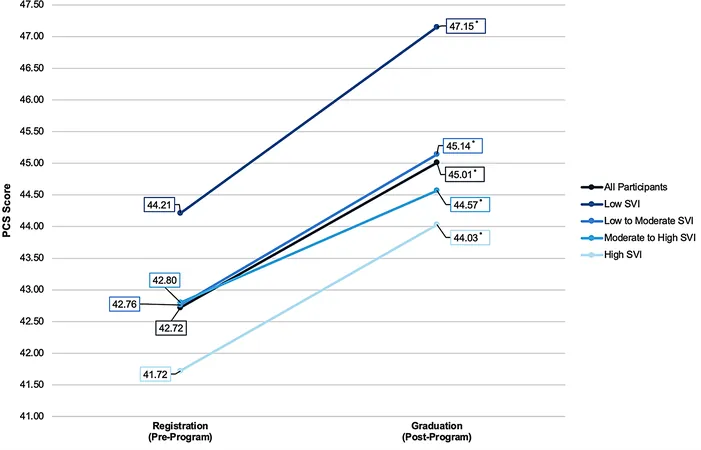
Singapore Introduces Stricter Financial Penalties to Combat Money Laundering in Real Estate Sector
2025-04-08
Author: Daniel
SINGAPORE:
In a decisive move, the Singaporean Parliament has approved a new Bill aimed at tightening financial penalties to effectively combat money laundering within the real estate sector. This legislative change, known as the Anti-Money Laundering and Other Matters (Estate Agents and Developers) Bill, was passed on Tuesday, April 8.
One of the significant reforms proposed in the Bill
is shifting the financial penalties on property agencies and their agents from a "per case" basis to a "per contravention" model. This adjustment means that if agencies or agents violate any regulations or codes related to money laundering, financing of terrorism, or proliferation financing, they will incur penalties more frequently – a strategy designed to create a stronger deterrent against illicit activities.
Second Minister for National Development and Finance, Indranee Rajah, emphasized the crucial role that estate agents, developers, and salespersons play in identifying and preventing illegal activities, alongside financial institutions and legal practitioners. "This Bill aims to strengthen our abilities to tackle illicit activities in the real estate sector and solidify Singapore’s commitment to combat money laundering and the financing of criminal enterprises," she stated.
Raising the Stakes on Financial Penalties
Currently, the rules allow for maximum fines of S$200,000 (approximately US$148,000) for agencies and S$100,000 for agents, which many lawmakers argue does not provide adequate deterrence given the lucrative monetary incentives for criminal transactions. Under the new framework, agents and agencies found in violation can face penalties of up to S$5,000 for each contravention. More serious violations will be treated by a Disciplinary Committee, which can impose the previously mentioned maximum fines, but now, they will also apply per contravention.
In an effort to elevate compliance, the new measures require real estate professionals to perform due diligence on all parties involved in transactions—not solely their clients. This requirement aligns Singapore’s regulatory practices with the international standards set by the Financial Action Task Force (FATF), which combats money laundering and terrorism financing globally.
Following Singapore's significant money laundering scandal that led to the arrest of ten individuals and the seizure of over S$3 billion, an inter-ministerial committee—headed by Rajah—was formed to review and propose enhancements to the anti-money laundering framework within the country.
Concerns from the Industry
Lawmakers have shown support for the Bill but have also expressed concerns regarding its implications for smaller real estate firms, who may lack the necessary resources to implement thorough due diligence processes. MP Vikram Nair highlighted that smaller agencies could face external pressure to comply with the new regulations while lacking the level of support that larger banks and law firms have.
The law's potential to increase operational costs raised alarm about risks to competition, particularly for smaller enterprises that operate on tight margins. MP Yip Hon Weng warned that excessive compliance costs could jeopardize the livelihood of these smaller firms.
In response to these concerns, Rajah assured that the new regulations strike a balance by ensuring proper compliance while not excessively burdening smaller players. She noted that industry associations, such as the Singapore Estate Agents Association, offer subsidized commercial screening services to help mitigate the financial impact on smaller firms.
To better equip agents and developers, training on anti-money laundering practices, terrorism financing, and proliferation financing will soon be made compulsory. This educational initiative underscores the government’s commitment to ensuring that all professionals in the sector are adequately prepared to meet the stricter standards.
Looking Ahead
While some MPs, including Jamus Lim, questioned whether the Bill's measures were sufficiently robust or merely incremental, Rajah acknowledged ongoing challenges in the system. She stated that although Singapore has made significant strides in its anti-money laundering regime, further enhancements are essential to meet evolving international best practices.
As Singapore takes a firm stance against financial crimes in its property market, the newly enacted measures represent a pivotal step toward safeguarding its reputation as a secure and trusted financial hub. With these efforts, the nation aims to not only deter illicit activities but also embrace transparency and integrity in its real estate dealings.
Stay tuned for future updates as the impact of these amendments unfolds in the industry!



 Brasil (PT)
Brasil (PT)
 Canada (EN)
Canada (EN)
 Chile (ES)
Chile (ES)
 Česko (CS)
Česko (CS)
 대한민국 (KO)
대한민국 (KO)
 España (ES)
España (ES)
 France (FR)
France (FR)
 Hong Kong (EN)
Hong Kong (EN)
 Italia (IT)
Italia (IT)
 日本 (JA)
日本 (JA)
 Magyarország (HU)
Magyarország (HU)
 Norge (NO)
Norge (NO)
 Polska (PL)
Polska (PL)
 Schweiz (DE)
Schweiz (DE)
 Singapore (EN)
Singapore (EN)
 Sverige (SV)
Sverige (SV)
 Suomi (FI)
Suomi (FI)
 Türkiye (TR)
Türkiye (TR)
 الإمارات العربية المتحدة (AR)
الإمارات العربية المتحدة (AR)